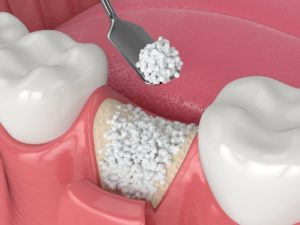
After living so long without secure teeth, you doubt that dental implants are possible for your smile. You have lost too much jawbone density over time, but with a bone graft, you can have permanent replacement teeth!
Before you undergo the implant placement procedure, you need to recover fully from your bone graft, but what does that look like? How long does it take to heal? Below, the recovery process is broken into smaller timeframes to help you know what to expect.
24 to 48 Hours After Bone Grafting
The time immediately following a bone graft is particularly important for the healing process. The incision site and surrounding area may be sore when the local anesthetic wears off, but you should be able to manage any pain with anti-inflammatory pain medication you find at any drugstore. If you notice swelling, apply a cold compress to your face.
Even though bone grafting is a minor surgical procedure, it is a good idea for you to rest for a day to allow your body to start healing. At night, brush your teeth as usual, but do not disrupt the site. You may rinse your mouth with warm saltwater to keep the area clean.
As far as eating is concerned, avoid using that area of your mouth to bite or chew, and you should stay away from hard, crunchy, spicy, or hot foods and drinks. Soft foods like yogurt, eggs, pasta, applesauce, and mashed potatoes won’t harm the incision or complicate your healing.
1 Week After Bone Grafting
By the time you reach a week, you should be healed enough to return to a normal diet and routine. However, you should make the transition over time, not all at once. Slowly reintroduce foods as tolerated, but you should still avoid contact with the site as much as possible.
You shouldn’t have to be extra careful when brushing or flossing—just do it as you usually do, and you should be fine.
3 to 6 Months After Bone Grafting
Although your mouth will likely be completely healed after a few weeks, the real bone grafting process is just beginning! During the months that follow, the jawbone will grow and become integrated with the grafting material, reinforcing the bone. This process can vary in length from patient to patient, so the timeframe may be longer than 6 months in some cases.
If you have questions about the recovery period after a bone graft, you can always turn to your oral surgeon. They can let you know about what you can expect, concerning symptoms, and when to reach out to them. Getting beyond this first step is critical if you want to have successful dental implants!
About the Practice
At Northern Virginia Oral, Maxillofacial & Implant Surgery, our five oral surgeons are proficient in all procedures relating to dental implants, including bone grafts. We will happily walk you through the entire process and let you know what is next, so you don’t worry unnecessarily. If you have questions about bone grafting or dental implants, you can schedule a consultation by contacting one of our locations online.
